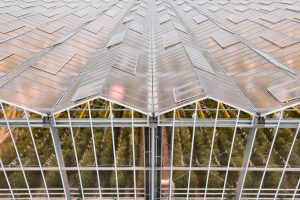Across the globe, people are increasingly turning to greenhouses and indoor vertical farms to grow commodities. The systems use far less land than conventional farms, thereby drastically reducing some environmental impacts, University of Florida researchers say.
They also require less transportation to get the food to consumers because they tend to be in or near urban areas, and their food tends to be safer.

Also known as controlled-environmental agriculture (CEA) — or “plant factories with artificial lighting” — they can help boost food production in urban and drought-prone regions.
In Florida, indoor farms can be found in such places as Tampa, The Villages, Jacksonville and Miami, said Ziynet Boz, a UF/IFAS assistant professor of agricultural and biological engineering.
On the flipside, indoor farms and greenhouses cost a lot of money to start and maintain. You need $50 to $150 per square foot to build a greenhouse. For a 10,000-square foot greenhouse, that’s $500,000 to $1.5 million, UF/IFAS researchers said.
That doesn’t include electricity, which accounts for 20 to 30% of your operational costs.
Boz led a newly published paper that examined research on the sustainability challenges faced by those growing crops and ornamental plants through CEA.
As outlined in the paper, the main obstacles for these indoor operations are:
- High electricity use, relative to traditional farming.
- Geography-related tradeoffs after the indoor farm is built. For example, extreme temperatures impact the effectiveness of your climate control system and your cost. Rural areas also may be cheaper but may require more transportation.
- Unfavorable public perception of CEA in comparison to field production. Consumers perceive “plant factories” as unnatural systems, and they want transparency.
“These issues are now being addressed by optimized lighting and sensor technology, decision-support tools to reduce electricity use and communications tactics to educate people about the benefits of CEA,” Boz said. “By addressing challenges, farmers and researchers can improve the sustainability, efficiency and yield of CEA operations.”
In this context, sustainability means the ability to produce food in a manner that consumes very few natural resources and produces lots of yield for the lowest environmental impact, Boz said.
Boz credits the majority of the research on the paper to two agricultural and biological engineering doctoral students – Donald Coon and Lauren Lindow.
Now that he’s participated in this research project, Coon has long-term suggestions for operators of indoor farms.
“Engage all three dimensions of sustainability – environmental, economic and social,” he said. “Produce a profitable product, with minimal adverse impact and listen and respond to what the consumers are looking for. Focusing on just one of those at a time is inefficient and risky.”
###
ABOUT UF/IFAS
The mission of the University of Florida Institute of Food and Agricultural Sciences (UF/IFAS) is to develop knowledge relevant to agricultural, human and natural resources and to make that knowledge available to sustain and enhance the quality of human life. With more than a dozen research facilities, 67 county Extension offices, and award-winning students and faculty in the UF College of Agricultural and Life Sciences, UF/IFAS brings science-based solutions to the state’s agricultural and natural resources industries, and all Florida residents.
WHY FOOD IS OUR MIDDLE NAME
Feeding a hungry world takes effort. Nearly everything we do comes back to food: from growing it and getting it to consumers, to conserving natural resources and supporting agricultural efforts. Explore all the reasons why at ifas.ufl.edu/food or follow #FoodIsOurMiddleName.
 3
3
